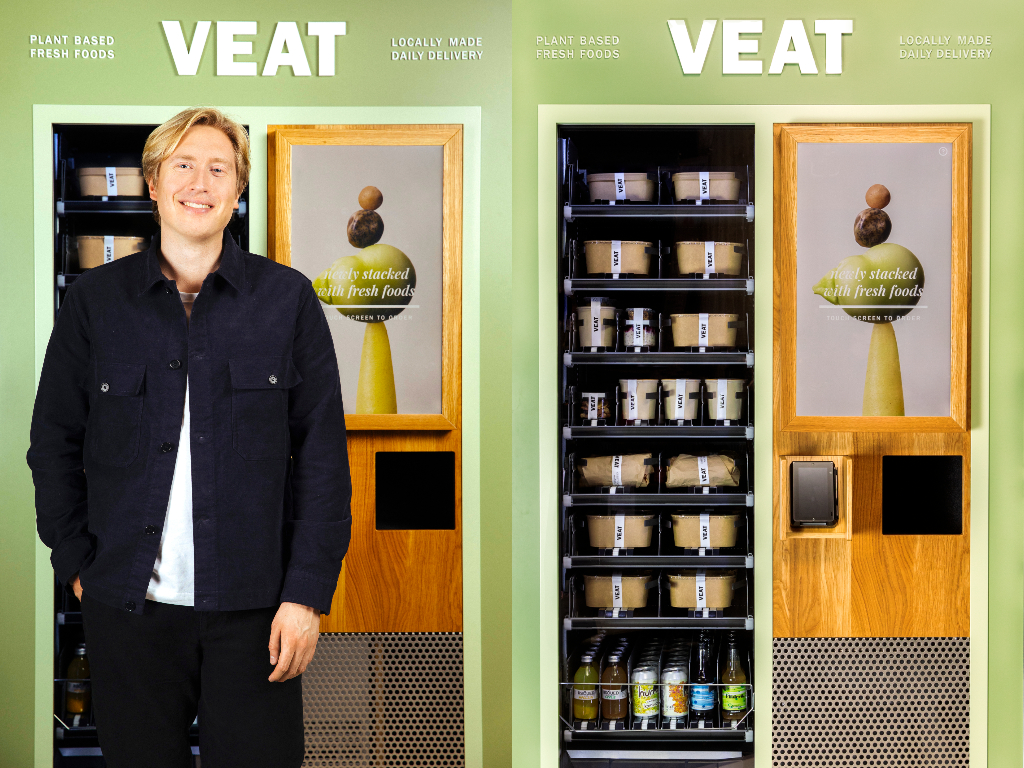3 Mins Read
Swedish startup VEAT has announced the closing of its €500,000 (US$591,000) pre-seed funding round, which will support the launch of its plant-based vending machines across its home city in Stockholm. On a mission to make sustainable plant-based foods more accessible with its vending machine solution that represents a particularly relevant alternative amid coronavirus restrictions on restaurants, VEAT says it plans to expand across other European capitals next year.
Among the investors joining the pre-seed funding round include early-stage climate startup venture capital Pale Blue Dot, Berlin-based seed fund Purple Orange Ventures and Shio Equity. Robert Ahldin of Stockholm-based private investment firm Edastra and Erik Segerborg, the former deputy chief of Russian classifieds platform Avito also participated in the round.
Founded by Andreas Karlsson in 2019, who developed the concept to solve some of the difficulties he faced on his own journey towards plant-centric eating, VEAT is a startup hoping to make plant-based and sustainable eating convenient and accessible with its vending machines. Inspired by similar solutions in the U.S. such as Chicago-bases Farmer’s Fridge and New York’s Fresh Bowl, VEAT hopes to establish 100% plant-based vending machines across Europe.
We’re changing this by offering delicious, plant-based foods made with local ingredients. And we bring it to places where people need fresh, nutritious food the most, such as at work, in public transport, in department stores, at universities, and at hospitals.
Andreas Karlsson, Founder & CEO of VEAT
“We need to change the way we eat, for human and planetary health. Eating in a nutritious, sustainable way in a busy urban life is often both difficult and expensive,” Karlsson explains.
“We’re changing this by offering delicious, plant-based foods made with local ingredients. And we bring it to places where people need fresh, nutritious food the most, such as at work, in public transport, in department stores, at universities, and at hospitals.”
Among some of the foods in stock at VEAT vending machines including salads, wraps and ready-meals and snacks and beverages, with affordable prices ranging from €2.80 to €8.30 (US$3.31 to US$9.81). All the products are designed by Swedish chefs and prepared in VEAT’s own kitchen using locally-grown ingredients, before delivered fresh daily to the machines, with the unsold items donated to local charities at the end of the day.
The startup has set up its first batch of machines this month across Stockholm, including in large department stores, co-working spaces, and headquarters of financial institutions, with more vending machines to come by the end of the year. In 2021, VEAT says it will take its solution to other European capitals, with the support of its latest pre-seed capital injection.
VEAT has the potential to fundamentally change the grab-and-go segment in European capitals. VEAT is lowering the barriers for people to adopt more nutritious and sustainable dietary patterns.
Hampus Jakobsson, General Partner at Pale Blue Dot
VEAT’s launch also comes at a time when the coronavirus pandemic has upended traditional restaurant services, making its safer grab-and-go alternative particularly relevant for people who are looking for nutritious and sustainable plant-based meals – especially key essential workers such as medical staff, first responders, transportation personnel and grocery store employees.
The ease and safety of vending machines amid the pandemic and the rising plant-based trend has also prompted New York City’s bodegas to bring in Plantega, a vegan fridge collective stocking products ranging from Miyoko’s Creamery to Beyond Meat, making plant-based products more accessible to underprivileged communities – many of whom work jobs that represent essential services amid the pandemic.
“The neat thing about vending machines as a distribution channel is that we’re more flexible, and that we can scale up faster and keep prices lower than conventional restaurants and cafés too,” said Karlsson.
“VEAT has the potential to fundamentally change the grab-and-go segment in European capitals,” added Hampus Jakobsson, general partner at Pale Blue Dot. “VEAT is lowering the barriers for people to adopt more nutritious and sustainable dietary patterns.”
Lead image courtesy of VEAT.




